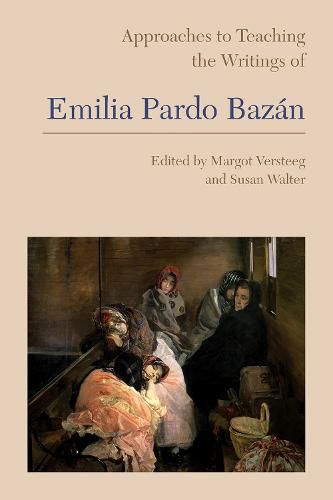Readings Newsletter
Become a Readings Member to make your shopping experience even easier.
Sign in or sign up for free!
You’re not far away from qualifying for FREE standard shipping within Australia
You’ve qualified for FREE standard shipping within Australia
The cart is loading…






‘Emilia Pardo Bazan (1851-1921) is without a doubt the most prolific and influential woman writer of late-nineteenth-century Spain,’ write the editors of this volume. Her writings - novels, novella, short stories, essays, plays, travel writing, cookbooks - cover topics from science and technology to fashion and gender equality. In a literary style characterized by brilliance, they contend with the critical issues of her time and are compelling to teach today.
Part 1, ‘Materials’, provides biographical and critical resources, an overview of Pardo Bazan’s vast oeuvre, and a literary-historical timeline. It also reviews secondary sources, editions and translated, and digital resources. The essays in part 2, ‘Approaches’, explore Pardo-Bazan’s engagement with contemporary literary movements, feminism and gender, nation and the late Spanish empire, Spanish and Galician identities, and nineteenth-century scientific and medical discourses. Film adaptations and translations of her works are also addressed. Instructors of courses on world literature, nineteenth-century literature, gender studies and Spanish-language courses will find the volume invaluable.
$9.00 standard shipping within Australia
FREE standard shipping within Australia for orders over $100.00
Express & International shipping calculated at checkout
‘Emilia Pardo Bazan (1851-1921) is without a doubt the most prolific and influential woman writer of late-nineteenth-century Spain,’ write the editors of this volume. Her writings - novels, novella, short stories, essays, plays, travel writing, cookbooks - cover topics from science and technology to fashion and gender equality. In a literary style characterized by brilliance, they contend with the critical issues of her time and are compelling to teach today.
Part 1, ‘Materials’, provides biographical and critical resources, an overview of Pardo Bazan’s vast oeuvre, and a literary-historical timeline. It also reviews secondary sources, editions and translated, and digital resources. The essays in part 2, ‘Approaches’, explore Pardo-Bazan’s engagement with contemporary literary movements, feminism and gender, nation and the late Spanish empire, Spanish and Galician identities, and nineteenth-century scientific and medical discourses. Film adaptations and translations of her works are also addressed. Instructors of courses on world literature, nineteenth-century literature, gender studies and Spanish-language courses will find the volume invaluable.